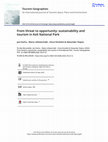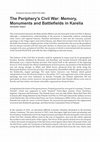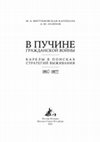Oral History in Karelia by Aleksandr Osipov
В третьем выпуске серии "Устная история в Карелии" опубликованы материалы, посвященные финской ок... more В третьем выпуске серии "Устная история в Карелии" опубликованы материалы, посвященные финской оккупации Карелии в 1941—1944 гг. В первой части особое внимание уделено гендерному аспекту оккупации. Интервью отражают исторический опыт различных национальностей Карелии, что позволяет лучше понять особенности финского оккупационного режима.
В данном сборнике опубликованы научные работы, посвященные теоретическим вопросам устной истории,... more В данном сборнике опубликованы научные работы, посвященные теоретическим вопросам устной истории, и интервью, освещающие повседневную жизнь в Карелии в предвоенное и послевоенное десятилетия с точки зрения людей, чья судьба в данный период была связана с Петрозаводским государственным университетом.
Papers by Aleksandr Osipov

Tourism Geographies, 2020
Across the globe, conservation has been increasingly in conflict with other human activities. Nat... more Across the globe, conservation has been increasingly in conflict with other human activities. National parks are an important concept in nature protection and probably the most recognized institution in nature tourism worldwide. The concept of sustainable nature tourism became a part of the planning and management of Finnish national parks at the beginning of the new millennium. We analyze the environmental conflict and the idea and practices of sustainable nature tourism from a historical perspective in one Finnish national park: Koli. The main research question is how has the concept of sustainability been used to resolve the conflict between tourism and nature protection? Our perspective is based on the essence of sustainable nature tourism as humanity's interaction with the environment. The main data of the study consists of interviews with park managers and planners and archival material from local newspapers. In Koli, the history of the founding of the park and tourism development were strongly affected by diverse nature relationships between different actors. In the human-nature relationship perspective, it was a matter of how the land was to be utilized, on an anthropocentric or eco-centric basis. From the park management point of view, sustainable nature tourism was a conceptual and practical tool to diffuse the conflict. Experiences in Koli show how eco-utilitarian perspectives toward nature conservation can help to resolve conflict. Today the idea of sustainability has been adapted by large-scale tourism developers and earlier failed vast plans for Koli are alive again, only reconceptualized with the idea of sustainability. This kind of economy-based sustainability in turn pushes the idea of sustainable nature tourism further from nature itself and eco-centric perspectives and provides foundations for a new conflict.

The confrontation between the Reds and the Whites was the main plot of the Civil War in Russia, a... more The confrontation between the Reds and the Whites was the main plot of the Civil War in Russia, although a comprehensive understanding of the process is impossible without considering other actors and regional features. National movements in Asia and the Caucasus, peasant uprisings in the Volga region and Central Russia, and Allied intervention from the Far East to the Baltic Sea formed a complex picture of the Civil War, and therefore the war on the periphery did not always coincide with the main plot. Karelia, to choose just one region, is an illustrative example of its own, peripheral Civil War, the memory of which is intertwined with the memory of the Second World War and with the idea of fighting an external enemy. The features of the Civil War in Karelia could be explained in many ways by its geographical location. Karelia, inhabited by Russians and Karelians and located between Petrograd and Murmansk, was a typical Russian province that found itself at the epicentre of the opposing forces in 1918. Despite the official establishment of Soviet power, the position of the Bolsheviks was not strong enough, as White and Allied forces advanced from the north along the Murmansk Railway. Across the province, the peasantry, dissatisfied with the agrarian policy of the Bolsheviks, staged uprisings. The main factor, however, was Finland, which gained independence from the Russian Empire in December 1917 and supported some of the peasant uprisings and even sent volunteers to Karelia. Formally, the Finnish authorities did not participate in these events, however, the government knew that Finnish officers were sent to Karelia and that timber merchants and public organizations financed them.
Laatokka. Suurjärven kiehtova rantahistoria, 2021
Ученые записки Петрозаводского государственного университета, 2021
Ученые записки Петрозаводского государственного университета, 2019
Arctic and North journal, 2017
The article presents the summary of the Ninth International Congress of Arctic Social Sciences. T... more The article presents the summary of the Ninth International Congress of Arctic Social Sciences. The authors focus on the key issues of tourism development in the Arctic and Subarctic regions, such as sustainability, involvement of local people and climate change. The conference reveals how research in the field of tourism is based on multidisciplinary approaches combining economics, sociology, history and meteorology. Another part of this review is dedicated to the definitions and nature of ecotourism, its development and history in the national parks of Finland and the Republic of Karelia. National parks Koli and Paanajarvi were taken as case studies of ecotourism development.
В июле 1920 г. части Красной армии вступили в деревню Ухта (ныне г. Калевала), расположенную на с... more В июле 1920 г. части Красной армии вступили в деревню Ухта (ныне г. Калевала), расположенную на севере Карелии, что позволило говорить о завершении гражданской войны. Под властью финнов оставались лишь две приграничные волости -Ребольская и Поросозерская. Заключение Тартуского мирного договора в октябре того же года означало возвращение волостей в состав Карельской Трудовой Коммуны (далее КТК) и урегулирование карельского вопроса на дипломатическом уровне.
Book Reviews by Aleksandr Osipov
Books by Aleksandr Osipov

Книга посвящена событиям гражданской войны, развернувшимся на территории Российской Карелии. В 19... more Книга посвящена событиям гражданской войны, развернувшимся на территории Российской Карелии. В 1918-1922 годах карельские регионы находились в фокусе противостояния различных военных и политических сил: здесь воевали отряды Красной армии и белого Северного правительства, подразделения Антанты и красных финнов, карельский отряд и финские добровольческие части. Значительное внимание уделяется роли молодого финского государства и группы финских активистов, инспирировавших три добровольческих похода в Карелию. В центре монографии-карельское крестьянство. Используя неизвестные российскому читателю материалы финских архивов, авторы анализируют политическую психологию карельского крестьянина, оказавшегося в центре ожесточённого военного противостояния, и показывают наиболее яркие проявления крестьянских стратегий. Читатель впервые получает возможность познакомиться с рапортами и воспоминаниями финских добровольцев, интервью и воспоминаниями карельских крестьян-участников событий-и финских политиков, материалами финского Генерального штаба и другими уникальными документами. В монографии уделяется особое внимание таким, всё ещё малоизученным проявлениям крестьянского активизма, как Карельский полк и Временный Комитет Беломорской Карелии, возглавлявший карельское квазигосударственное образование на северо-западе региона. Отдельные главы посвящены созданию Карельской Трудовой коммуны и Карельскому восстанию, ставшему последней попыткой создания независимого, небольшевистского карельского национального государства. УДК 94 ВВК 63.3(2)612




Uploads
Oral History in Karelia by Aleksandr Osipov
Papers by Aleksandr Osipov
Book Reviews by Aleksandr Osipov
Books by Aleksandr Osipov